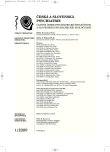-
Medical journals
- Career
Therapy of Patient with Dementia Directed to Orientation in Reality
Authors: P. Tavel
Authors‘ workplace: Centrum pre výskum spoločenských aspektov zdravia UPJŠ, Košice ; Katedra psychologie, Filozofická fakulta UP, Olomouc
Published in: Čes. a slov. Psychiat., 105, 2009, No. 1, pp. 32-35.
Category: Comprehensive Reports
Overview
According to ageing population in Europe the problem of dementia is an increasing topical problem. Beside pharmacological approach there is an ambition to develop nonpharmacological approaches that make a common accessible treatment of dementia more effective. Therapy of patient that is searching after his orientation in reality is one of nonpharmacological approaches. This approach is one of the oldest and one of the most verified by a research. It focuses on cognitive capacities of a demented patient. Losses of those capacities are most connected with dementia. There are characterized two forms of therapies in common: 24-hour form and a form of sessions; both of them have it‘s particularities and advantages. Even though many unsolved questions are connected with therapy, it could bring positive changes in certain cases.
Key words:
dementia, nonpharmacological approach, senility, dementia psychotherapy.
Sources
1. Baštecký, J. a kol.: Gerontopsychiatrie. Praha, Grada Avicenum, 1994. isbn 80-7169-070-8.
2. Breuil, V., De Rotrou, J., Forette, F., Tortrat, D., Ganansia-Ganem, A., Frambourt, A., Moulin, F., Boller, F.: Cognitive stimulation of patients with dementia: Preliminary results. International Journal of Geriatric Psychiatry, 9, 1994, pp. 211-217.
3. Feil, N.: Validation in Anwendung und Beispielen. 4. vyd. München/Basel: E. Reinhardt, 2004. isbn 3-497-01687-X.
4. Holmerová, I., Rokosová, M., Suchá, J., Veleta, P.: Nefarmakologické přístupy k pacientům postiženým demencí a podpora pečujících rodin. Neurologie pro praxi, 5, 2004, s. 17-20.
5. Jones, G.: Validation therapy: a companion to reality orientation. Canadian Nurse, 81, 1985, pp. 20-23.
6. Kitwood, T., Bredin, K.: Towards a theory of dementia care: personhood and well-being. Ageing and Society, 12, 1992, pp. 269-287.
7. Reeve, W., Ivison, D.: Use of environmental manipulation and classroom and modified informal reality orientation with institutionalized, confused elderly patients. Age and Ageing, 14, 1985, pp. 119-121.
8. Spector, A., Davies, S., Woods, B., Orrell, M.: Reality orientation for dementia. The Gerontologist, 40, 2000, pp. 206-212.
9. Spector, A., Orrell, M., Davies, S.: Can reality orientation be rehabilitated? Development and piloting of an evidence-based programme of cognition-based therapies for people with dementia. Neuropsychological Rehabilitation, 11, 2001, pp. 377-397.
10. Williams, R., Reeve, W., Ivison, D., Kavanagh, D.: Use of environmental manipulation and modified informal reality orientation with institutionalised, confused elderly subjects: a replication. Age and Ageing, 16, 1987, pp. 315-318.
11. Woods, B.: Psychologische Therapie bei fortgeschrittener Demenz. In Maercker, A. (ed) Alterspsychotherapie und Klinische Gerontopsychologie. Heidelberg, Springer, 2002, s. 341-357.
12. Woods, R. T.: Psychological „Therapies“ in dementia. In Woods, R. T. (ed) Psychological problems of ageing. Chichester/New York: John Wiley & Sons, 2006, pp. 311-344.
13. Zanetti, O., Frisoni, G. B., De Leo, D., Buono, M. D. Bianchetti, A., Trabucchi, M.: Reality orientation therapy in Alzheimer disease: useful or not? A controlled study. Alzheimer Disease and Associated Disorders, 9, 1995, pp. 132-138.
Labels
Addictology Paediatric psychiatry Psychiatry
Article was published inCzech and Slovak Psychiatry

2009 Issue 1-
All articles in this issue
- Perception of Restriction and Coercion during Nonvoluntary (Imposed) Hospitalization and after Dismissal
- Patient’s Subjective Well-being with Antipsychotic Treatment
- Possibility of Aggressiveness Evaluation by Means of Projection Tests in Psychiatric Patients
- Stress in the Psychiatric Nursing
- Therapy of Patient with Dementia Directed to Orientation in Reality
- Czech and Slovak Psychiatry
- Journal archive
- Current issue
- Online only
- About the journal
Most read in this issue- Possibility of Aggressiveness Evaluation by Means of Projection Tests in Psychiatric Patients
- Stress in the Psychiatric Nursing
- Therapy of Patient with Dementia Directed to Orientation in Reality
- Perception of Restriction and Coercion during Nonvoluntary (Imposed) Hospitalization and after Dismissal
Login#ADS_BOTTOM_SCRIPTS#Forgotten passwordEnter the email address that you registered with. We will send you instructions on how to set a new password.
- Career

